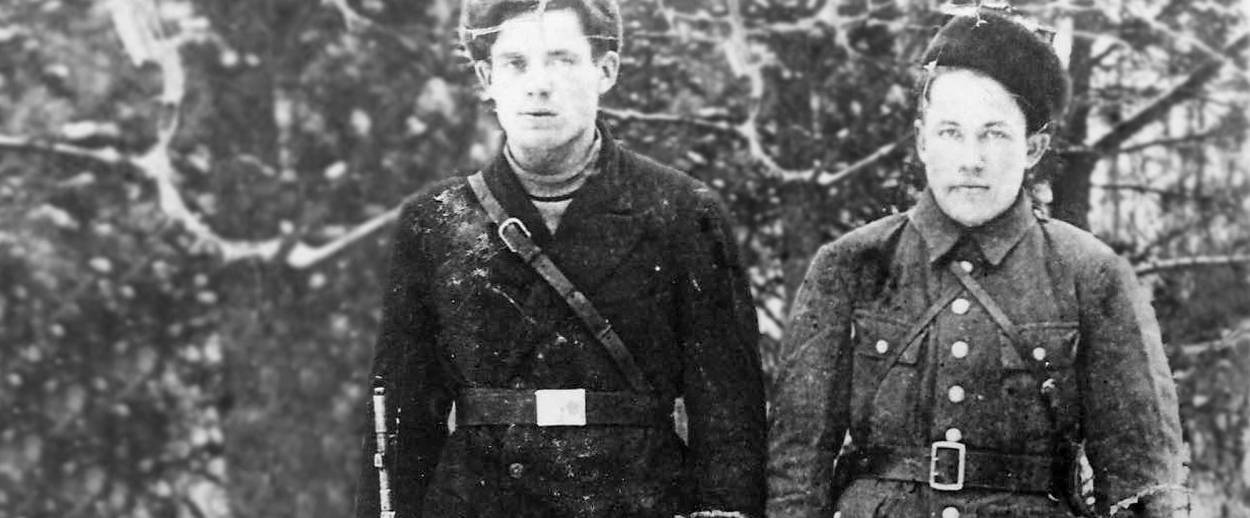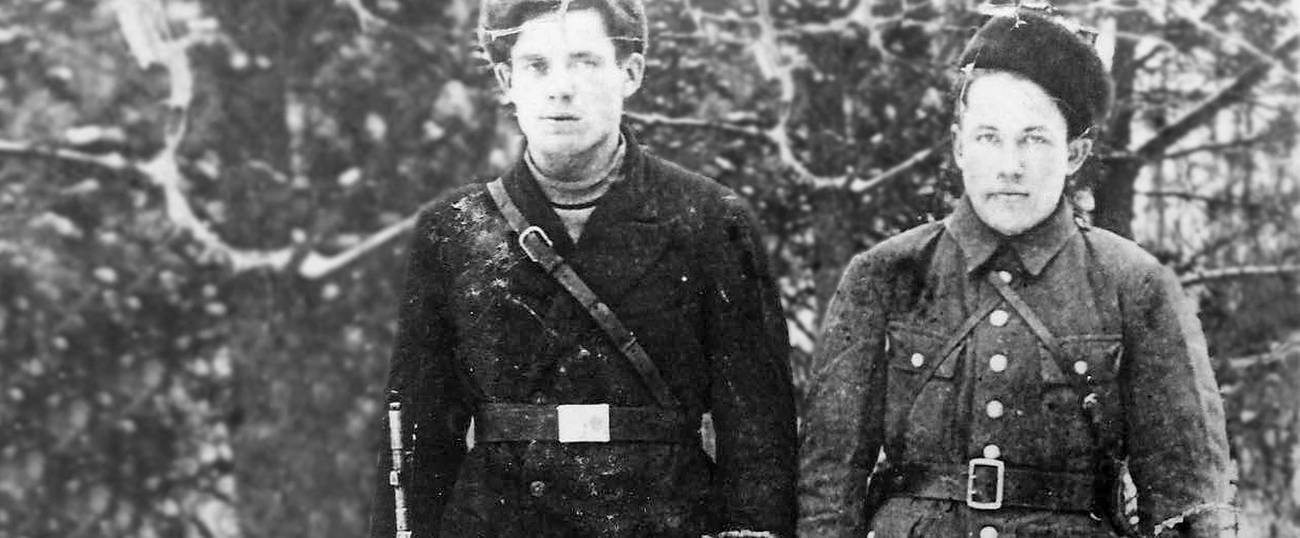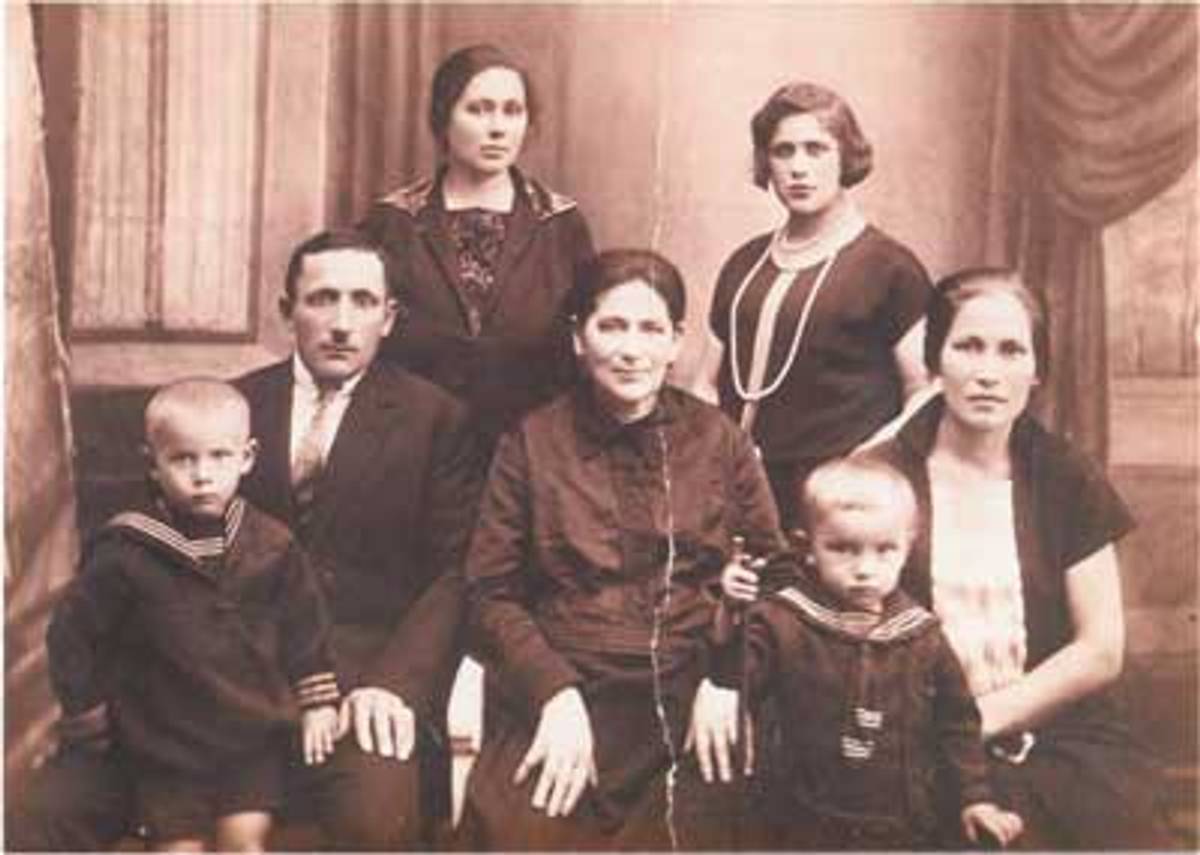When ‘Never Forget’ Becomes ‘I Don’t Remember’
My father always told us about how he survived the Holocaust. Now that dementia has taken his memories away, it’s my turn to tell his stories.




“Where was I during the Holocaust?” my father—a widower, living in an assisted-living apartment—asked during a recent Skype call with my brother.
My brother and I knew very well where he had been during the Holocaust; we’d heard stories since we were children. But now that my father has been diagnosed with progressive dementia, “Never forget” has often turned into “I can’t remember.”
From an early age, I knew my father was a survivor. I knew how he and one of his two brothers made it through the war fighting the Germans as Jewish partisans in the Belorussian forest. Dad always talked about the war years. He’d spend hours around the kitchen table after dinner, drinking tea with my mother and their friends; or a little vodka with his landsmen with names like Yisroel Chanowitz and Judah Yungelson, talking loudly in Yiddish about how they survived and others had not.
In later years, I would feel pride and gratitude over how Dad made it through those years that forever defined who he was. Yet as a kid, I looked on with an array of other emotions. Acceptance—this was my family. Bewilderment—we heard a story here and there, but never a full chronology. Even embarrassment when I was put in between our two worlds—the “old country” and the new world—like at an elementary-school open house, when Dad’s foreign-accented English stuck out. I also felt disappointment when, for example, he never became a fan of my budding Little League baseball career, or other parts of my life as I grew up, perhaps because he never grasped baseball, or the other games of modern American life, like a native.
His survivor-hood hung like a cloud over our household. Though I couldn’t tell you as a youngster what was wrong, he suffered from survivor’s guilt. His mother and youngest brother, both of whom I’m named after, were shot and killed after the secret hiding place he had secured for them was discovered. The Nazis had shot to death his father, an aunt, and cousin as punishment after my father and his only other brother joined the Jewish resistance. I didn’t know that as a kid. All I knew was that when my two younger brothers and I would horse around, my mother would shush us. Somehow we understood. Our father had suffered enough already.
***
In the early 1990s, after the Iron Curtain fell, a group of fellow survivors organized a return to their town of Glebokie—part of Poland before the Soviet and Nazi invasions during the war, and now part of Belarus—ostensibly for a memorial service 50 years after its destruction. Dad was ambivalent about returning, facing his tortuous past, but when he decided to go virtually at the last minute, my brothers and I joined him, for we too wanted to journey into a world we had grown up hearing about, often harassed by the same nightmares our father endured.
Back in Eastern Europe, Dad was a man transformed. Normally reticent to show emotions, he burst into heartfelt sobs as he entered the apartment of our Lithuanian driver’s Jewish grandmother. She embraced him like a mother meeting her lost son. At the Vilna synagogue, by chance, he met a thin, gray-haired man whom he last saw when they were second-grade classmates. They hugged, as my father cried uncontrollably.
Such outbursts occurred again and again, unpredictably, culminating when we finally reached Glebokie. Fellow survivors, who had arrived from Israel, Germany, other parts of Belarus, and the United States, swarmed to our car in a bubbling mixture of Hebrew, Yiddish, and Russian, hugging and kissing each other through tears and joyous laughter.
I had never seen my dad so alive. That week, when he cried I could feel the pain and sorrow. When he laughed, it was uninhibited joy. From early morning until after midnight, I saw my dad engaged with life, talking mostly in Yiddish to long-ago friends whose lives the Holocaust also had haunted.
When my dad searched for his old family house, I watched his determination as we walked in vain up and down his old street, through neighbors’ cabbage, beet, and potato gardens. Throughout that week, though his town was a shadow of its prewar years, my dad felt like he belonged, and I saw in him a level of contentment often absent as he’d negotiated life in an American society that even after 50 years often made him feel like a foreigner.
At our breakfast table the morning I was to fly home, the two of us sat alone, sipping tea and eating thick brown Russian bread and wild blueberries. Silence filled the little kitchen until my dad announced: “This is probably the best vacation I’ve ever had,” his voice cracking as tears began to swell in his eyes. I nodded my understanding, unable to speak, as both of us silently wept.
***
Earlier this year, going through a photo album of that trip in his apartment, I found a picture of him and his fellow landsmen. We were sitting together on his sofa and I showed him the photo.
He stared at it, then handed it back.
“It’s hard for me to see it,” he said, a reference to his increasingly poor vision due to macular degeneration.
“When were we there?” he asked.
“August 1993,” I said.
“I don’t remember,” he said.
Similar incidents have surfaced since his diagnosis last year. Once while visiting, I pulled a book about the Holocaust from his bookshelf. He didn’t remember that 6 million Jews had perished.
Recalling stories he’d told me since childhood, I wondered if he’d remember other details, like the circumstances over how he was accepted into the partisans. Or how his friend David Eiges hid in a barrel of flour in a bakery, listening to the sound of machine guns as German soldiers rounded up his neighbors during the liquidation of the Glebokie ghetto in 1943—a story I first heard from David himself when I was just 13. Not long ago, my questions would have triggered an hour worth of storytelling. “Did I ever tell you about … ?” Inevitably, the answer, was, “Yeah, Dad.” But he’d go on, telling the story with full detail.
Now when I asked him for some of those same details, he replied simply, “I forget.”
Fortunately, my father has already recorded his personal history. The USC Shoah Foundation interviewed him about his life for several hours back in 1997. I transcribed those interviews, and they served as the basis of a memoir he commissioned another writer to compile. My uncle also published his own memoir before he died. And my father had a yizkor or memorial book on the destruction of Glebokie translated into English.
But as his memory fades, I’m losing a part of my dad, losing the fact that we no longer can rely on him for detailed stories or go to him to clarify questions. That’s more than sad. I’m grateful that he shared as much as he did, but I’m only now coming to terms with the reality that Dad no longer remembers his saga or can tell it—like a TV series you thought would always being there that finally goes off the air. That’s how dementia works, erasing its victims’ past. I credit him and my mom for instilling within my brothers and me the value of our family’s story. So, I also feel a responsibility to carry his story forward.
I’ve heard it said about other Holocaust survivors with dementia that it’s a blessing that they can let go of those painful memories. I don’t buy it. If a few years ago, we suggested Dad could live the rest of his life unburdened by his tragic past, but at the cost of forgetting everything else, too, he’d pass at the offer. Or so I believe. He would have said, “I can handle the pain. It’s part of life. It’s not worth what I’d give up.”
But he didn’t get that choice. And I mourn that my dad, the last link to that generation of my family, struggles to remember his town, the people, and his past.
I’m a believer that anchoring Judaism to the memory of the Holocaust and the survival of Israel will never be enough to sustain or reinvigorate vibrant Jewish life in the Diaspora. But like the biblical commandment to never forget what Amalek did to the Israelites, remembering my father’s Holocaust history is a part of my DNA.
His dementia marks a signal for me to pick up his torch; to remind my millennial kids of their zayde’s life story, a saga they know, but like me, will always have more questions about. One of my first cousins has already taken up that torch, helping lead the Jewish Partisan Educational Foundation, which develops educational material about the 20,000 to 30,000 Jewish fighters and their life lessons.
It’s also not too late to switch roles and begin re-telling Dad’s stories back to him. When we visit or call him, we sometimes try engaging him by telling his stories.
Recently, while visiting, I showed him an old framed family photo. He’s sitting by his father’s side, all of about 6 years old. My uncle, then about 3, is sitting next to their mother. Their grandmother is in the photo, along with a cousin and an aunt.

“Remember, Dad. When you were a little older, you used to work in your father’s shop? He sold grain, right?
“Flour,” my dad corrected me. “Different kinds of flour.”
“How old were you when you worked for your father?”
He paused for a moment. “Twelve. 13. He used to buy grain from farmers, take it to a mill and make flour,” Dad recalled.
Soon he may not remember those details, finally letting go of this piece of his past, too. In the meantime, though, I wonder when he dozes off, as he frequently does these days, if he’s back in his town or the forests, knowing full well where he was during the Holocaust.
***
Like this article? Sign up for our Daily Digest to get Tablet Magazine’s new content in your inbox each morning.
Leonard Felson has written for the New York Times, The Boston Globe, Reader’s Digest, The Jerusalem Report, and other publications.